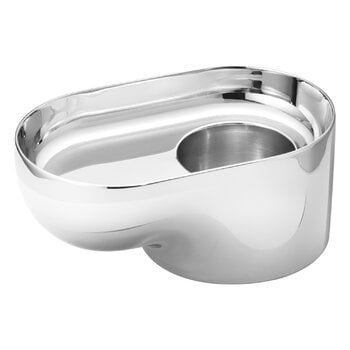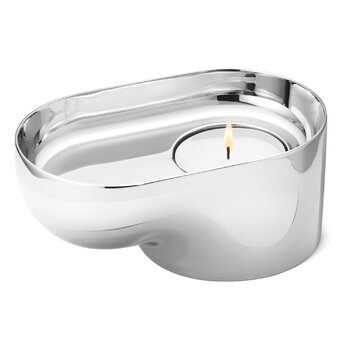Georg Jensen's Nendo tealight holder charms with its stunningly beautiful appearance which has been inspired by nature and natural soft curves and elements. The Nendo candleholder is made of stainless steel, which is polished silver and shiny – the reflective surface creates an eye-catching combination with the vivid glow of the flames. The tealight holder is delightful on its own, but it is also easy to combine with other candleholders and vases from the Nendo collection to create stunning installations.
Nendo tealight holder, stainless steel
Georg Jensen
Description
Georg Jensen's Nendo tealight holder charms with its stunningly beautiful appearance which has been inspired by nature and natural soft curves and elements. The Nendo candleholder is made of stainless steel, which is polished silver and shiny – the reflective surface creates an eye-catching combination with the vivid glow of the flames. The tealight holder is delightful on its own, but it is also easy to combine with other candleholders and vases from the Nendo collection to create stunning installations.
Product details (5)
- Material
- Stainless steel
- Colour
- Stainless steel
- Width
- 11.5 cm
- Depth
- 7 cm
- Height
- 5.1 cm
- Product ID
Designer
Japanese designer and architect Oki Sato was born in 1977 in Toronto, Canada, and has since lived and worked in Japan. He studied architecture at Waseda University in Tokyo and founded the design studio Nendo after graduation in 2002. Oki Sato has received multiple awards and recognitions: in 2012 he was named the Designer of the Year by Wallpaper magazine and he has also won the Good Design Award, the German Design Award and the Elle Deco International Design Award, among others. Oki Sato has worked with Starbucks, Puma and Cappellini.
Oki Sato is inspired by Japanese clearness and his design style can be described as soft and minimalist. His aim is to change the way people interact with the objects around them, and his work often includes small details that evoke memories and thoughts – fragments of people's lives.
View all productsReviews (0)
Sustainability
The Product Sustainability Framework, our criteria of sustainable design, helps you find the most sustainable products in our selection. Read below which sustainability criteria this product has met.
Working conditions & labour 9/9
-
Equal opportunities for all employees
-
Commitment to UN Global Compact, fair compensation for all employees
-
Corporate responsibility requirements defined and communicated for suppliers
-
Systematic work for improved inclusion and well-being in the workplace
-
Transparent supply chain
-
Suppliers' compliance to a code of conduct ensured
-
Direct suppliers audited and certified
-
Compliance to the UN Guiding Principles on Business and Human Rights ensured in the supply chain
-
Support for community involvement in the supply chain
Eco-friendly production 6/9
-
Fair and resource-wise water-use in production
-
No incineration or landfilling of returned items
-
No use of endangered species as materials
-
No direct environmental emissions or waste (excl. GHGs) from production
-
Material-efficient and ecological packaging
-
No potentially harmful chemicals used in own production
-
The sustainability of direct suppliers' production is addressed and monitored
-
Production and material sourcing that respect biodiversity, animal rights, and natural ecosystems
-
Positive impact on nature’s well-being through operations that regenerate natural ecosystems
Climate impact 4/8
-
Company's direct greenhouse gas emissions identified and commitment to reduction
-
Product's carbon impact identified and commitment to reduction
-
Guidance on energy- and eco-efficient use of the product
-
Contribution to climate initiatives beyond the brand’s direct operations
-
Low-carbon or compensated transportation
-
Carbon footprint of the product calculated and goals set to reduce it
-
100 % renewable energy in own production and operations
-
Carbon neutral or carbon negative product
Sustainable materials 5/6
-
Sustainable and long-lasting material choices
-
No harmful or hazardous substances
-
Responsible raw material sourcing and production
-
Materials suited for circularity: monomaterials, recyclable finishings, renewable or recycled contents etc.
-
Ecological materials: natural, biodegradable, recyclable or recycled contents
-
Outstanding materials in terms of innovativeness, responsibility, sustainability and circularity: local production or sourcing, 100 % recycled content, C2C-certification etc.
Circular design 4/5
-
High aesthetic quality promoting long-term use of the product
-
Technically durable product design and material choices
-
Design for enduring life-long quality
-
Design and support for product maintenance, repair and upgradability
-
Innovative circular design solutions: circular service system, resale platform, remanufacturing, collection of used products, etc.









